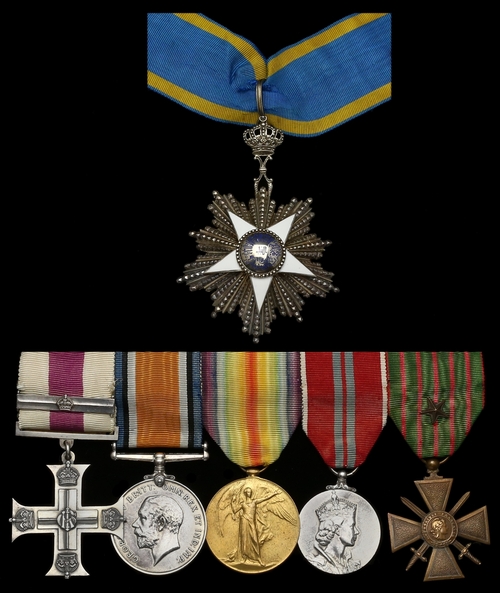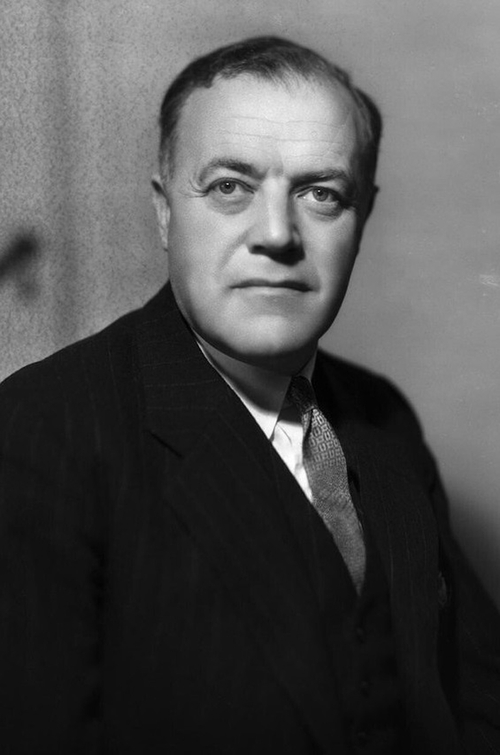Auction: 25003 - Orders, Decorations and Medals
Lot: 207
(x) 'A powerful pair of lungs is lost to the House of Commons by the sudden death of Mr Richard Stokes, socialist M.P. and former minister.'
The Belfast Newsletter refers
A Great War M.C. and Bar group of six awarded to Major R. R. Stokes, Royal Field Artillery
An industrialist, he was also a prominent Labour Member of Parliament, who further worked 'in the shadows' with MI6, in order to seed unrest in the Soviet Union; in 1950 became Minister of Works, he was appointed Lord Privy Seal and the new position of Minister of Materials in 1951, succeeding Ernest Bevin
Military Cross, G.V.R., with Second Award Bar, unnamed as issued; British War and Victory Medals (Major. R. R. Stokes.), official corrections to first; Coronation 1953; France, Third Republic, Croix de Guerre, bronze with silver star upon riband; Egypt, Kingdom, Order of the Nile, Commander's neck Badge, silver-gilt and enamel, by Bichai, in fitted case of issue and with full neck riband, mounted as worn by Spink & Son where applicable, good very fine (6)
M.C. London Gazette 18 October 1917:
'For conspicuous gallantry and devotion to duty. After the F.O.O. of his battery had been killed, he took his place and restored communication with the battery under intense fire. Accompanied by a gunner, he went out several times on a most exposed ridge and mended the telephone lines, which were being repeatedly cut. Each time they returned they carried a wounded man to cover.'
Second Award Bar to M.C. London Gazette 16 September 1918:
'For conspicuous gallantry and devotion to duty. This officer, who was acting in command, was engaged in withdrawing the battery in accordance with orders he had received, when they were suddenly caught by a very heavy barrage from the enemy, who launched an attack. Notwithstanding, many difficulties and very bad ground he managed to get a section away, and in spite of heavy casualties withdrew the detachments of the other guns after rendering them unserviceable to the enemy. He afterwards brought his guns into action again, handling them with great courage and skill under difficult circumstances, and by the observations he made personally in exposed places he was able to give valuable support to the infantry.'
Egyptian Order of the Nile bestowed 1939.
Croix de Guerre London Gazette 29 November 1918.
Richard Rapier Stokes was born at Wandsworth, London on 27 January 1897, the son of Philip Folliott Scott Stokes, a barrister. Educated at Downside he had the distinction of being appointed Captain of the school in 1915. Upon leaving Downside he attended RMA Sandhurst being commissioned 2nd Lieutenant in the Royal Field Artillery on 10 May 1916. Entering France on 1 June 1916 he won the Military Cross and Bar, the French Croix de Guerre and was gazetted Major when just 20 years old. His uncle Wilfred Stokes was the inventor of the Stokes mortar and no doubt the young Stokes would have seen it in use during the conflict.
Returning to civilian life, Stokes received his engineering degree and a Rugby Blue at Trinity College, Cambridge, following which he entered the family business of Ransomes and Rapier, Ltd. becoming its chairman in 1927 at the ripe age of thirty. In addition, he was managing director both of Ransomes and Rapier, Ltd., and of Cochran and Co. (Annan), Ltd.
Politics beckons
Entering politics, Stokes unsuccessfully contested for Labour the Glasgow Central seat in 1935. Adopted as the Labour Party candidate for Ipswich he entered the House of Commons in February 1938 retaining his seat until his death. In 1939 he was made a Commander of the Order of the Nile by Egypt for his significant work in the remodelling of the Assiut Nile barrage.
Whilst Stokes had personally distinguished himself during the Great War, he returned with a deep and lasting hatred of war. When the topic of rearmament was first suggested by the Government in the early 'thirties, Stokes offered that all work done by his firm for this purpose should be done at cost price. Extraordinarily the offer was rejected.
Not only was he opposed to the country's involvement in the Second World War, he also questioned the conduct, particularly the bombing of German cities. He was part of the influential Hankey lobby that lobbied in favour of Wehrmacht Generals so that they would be able to fight against the Soviet Union if needed.
Active in opposition to the Coalition Government all through the war years, Stokes was particularly critical of the situation that arose over the supply of tanks. He criticised the Labour Government of 1945-50 with equal vigour when he differed on policy, notably in connection with the Middle East, the American loan, and the administration of Western Germany.
He possessed two rare qualities amongst politicians of the day, fearlessness and independence, delivered in an outspoken manner regardless of any embarrassment he might cause.
Into the shadows
Much has been written about Stokes and his time whilst in politics, especially his deep abhorrence of war, and the threat posed by Russia. Quoting Spartacus Educational:
'It has recently been revealed that Stokes worked closely with MI6 between 1945 and 1950 to stir up ethnic strife in the Soviet Union through groups of exiles based in London and run by eastern European fascists, including Intermarium, the Promethean League, and the Anti-Bolshevik Bloc of Nations. Through the British League for European Freedom he campaigned for former Nazis and their eastern European collaborators to be brought to Britain as intelligence assets in the nascent cold war.'
He became Minister of Works in 1950 and was appointed Lord Privy Seal in April 1951 after the death of Ernest Bevin His next appointment was Minister of Materials in July 1951. In late 1951 he was sent as the emissary of Attlee to try to persuade the new Iranian Prime Minister, Dr Mohammed Mossadeq, not to nationalise the Anglo-Iranian Oil Company, an affair which became known as the Persian Oil Crisis.
Ironically, given the present economic climate, Stokes warned political colleagues not to impose high taxation on the middle-class voters who could become the mainstay of the Labour Party. He also campaigned about Labour government's education policy that he argued discriminated against Roman Catholic schools and their religious practices. After Labour lost the election in 1951, he became the opposition front bench defence spokesman. It was reported in the press in July 1957 that Stokes was in trouble with his constituency labour party in Ipswich because of his attitude to nationalisation and his insistence that Britain test the H bomb. He forthrightly insisted that he was not going to resign.
For a comprehensive biography of Stokes, the reader is directed to the Dictionary of Labour Party Biography. Politico's. pp. 546-8.
He died at home in London, the result of a heart attack on 3 August 1957, following a road accident that July when his car overturned during a thunderstorm on the flooded London road at Stanway near Colchester; sold together with copied research and two cased medallions: British Empire Exhibition 1925 and Trinity College Athletics Club, this engraved 'Trinity v Jesus 100 yards, R R Stokes, October 1921' and a copy of Eighty Years of Enterprise 1869-1949, this being a history of the family business.
For his miniature dress medals, please see Lot 328.
Subject to 5% tax on Hammer Price in addition to 20% VAT on Buyer’s Premium.
Sold for
£1,900
Starting price
£800







